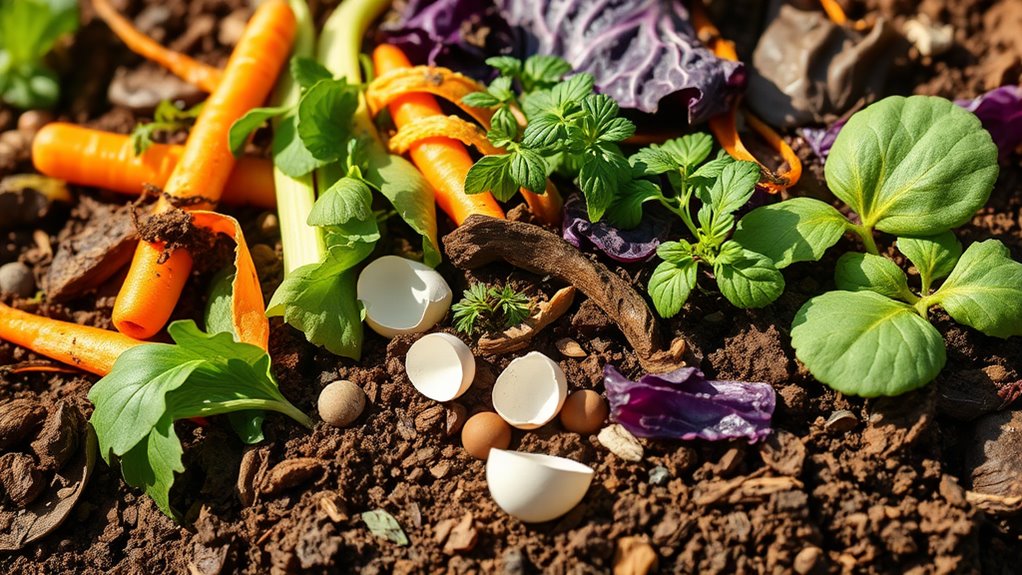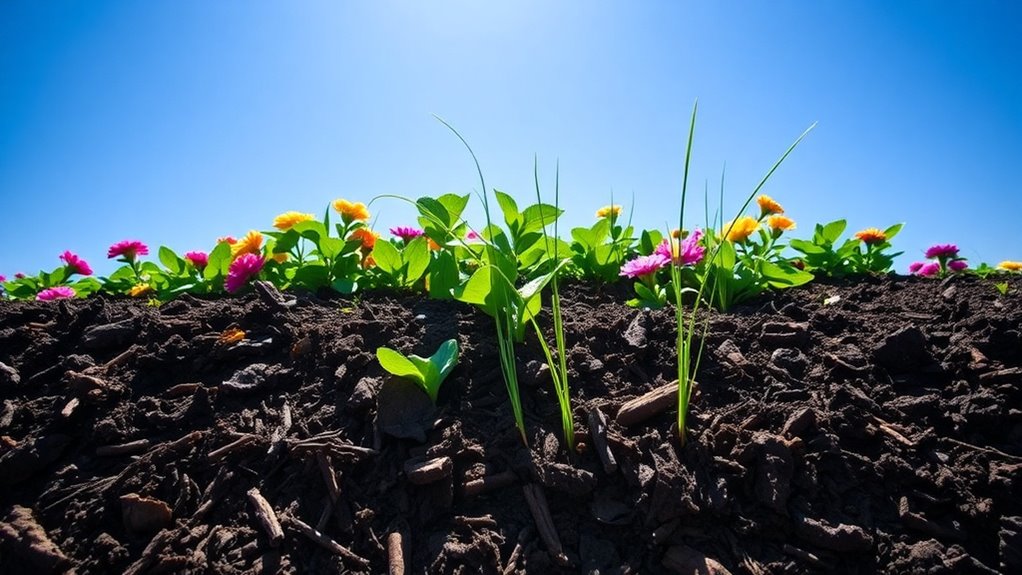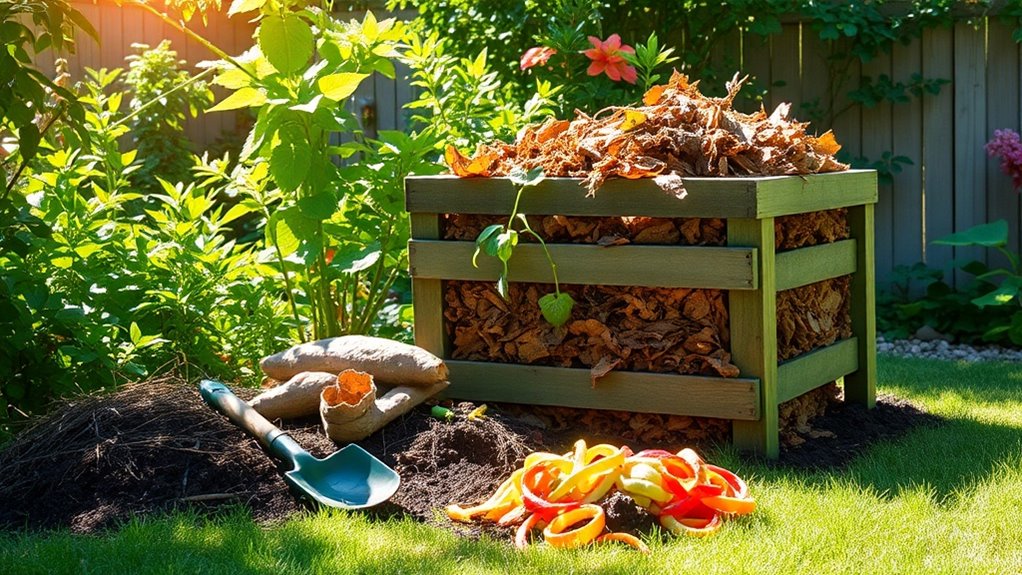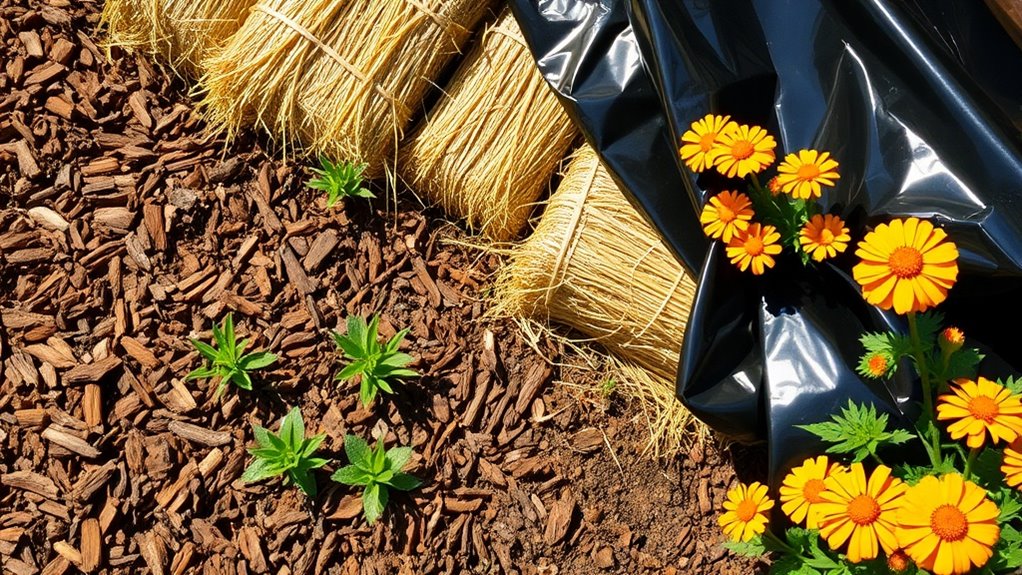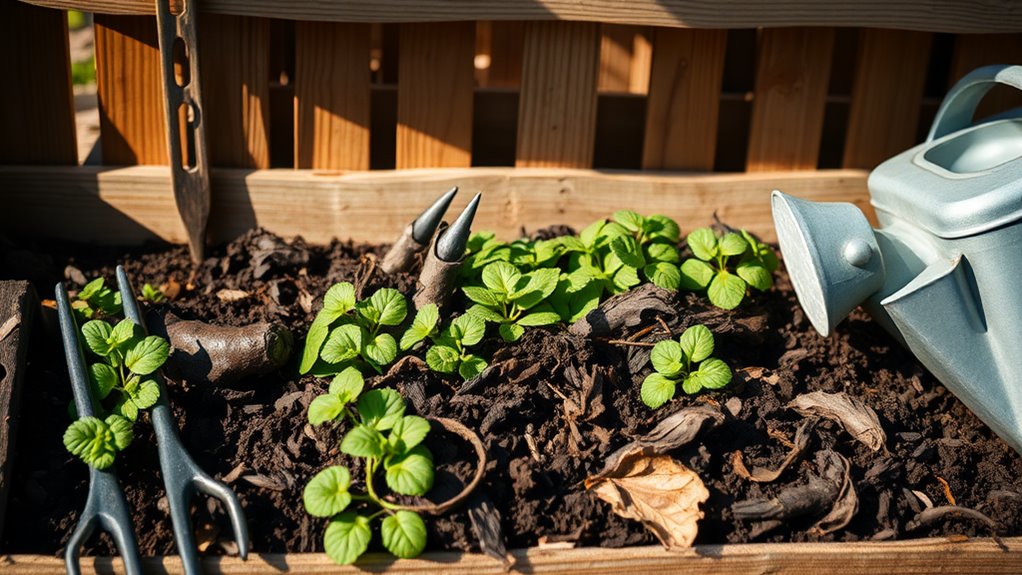These Compost Ingredients Will Supercharge Your Soil
To supercharge your soil, incorporate nitrogen-rich greens like kitchen scraps, grass clippings, and coffee grounds, alongside carbon-rich browns such as dried leaves and straw. Add crushed eggshells for calcium and worm castings to enrich nutrients while enhancing microbial activity. Balanced manure also boosts fertility. Regularly turning your compost aids decomposition, ensuring nutrient density. When you combine these ingredients effectively, you’ll elevate your garden’s health and vigor. Discover further insights to maximize your composting success.
Nitrogen-Rich Greens
Nitrogen-rich greens, often referred to as “green materials,” are essential components in composting that greatly enhance soil fertility.
These compost ingredients, such as kitchen scraps, grass clippings, and fresh leaves, provide the nitrogen necessary for microbial activity. When you incorporate these materials into your compost pile, you stimulate decomposition, resulting in nutrient-dense compost. It’s vital to balance greens with carbon-rich browns to maintain an ideal carbon-to-nitrogen ratio, generally around 30:1. This balance guarantees efficient composting and prevents odors. Additionally, transforming kitchen scraps into compost not only reduces waste but also contributes to a more sustainable gardening practice.
Carbon-Rich Browns
Carbon-rich browns are essential for creating a balanced compost pile, as they supply the carbon needed to complement nitrogen-rich greens.
These materials enhance microbial activity and promote decomposition, ultimately enriching your soil. Incorporating a variety of carbon-rich materials, such as dried leaves, can further boost the effectiveness of your compost.
Here are some excellent carbon-rich browns to incorporate into your compost:
- Dried leaves
- Straw or hay
- Wood chips or shavings
- Cardboard (shredded)
- Paper (non-glossy, shredded)
Kitchen Scraps
Kitchen scraps play an essential role in composting, providing an excellent source of nitrogen that fuels microbial growth and accelerates the decomposition process. Items such as fruit and vegetable peels, coffee grounds, and eggshells contribute crucial nutrients, enhancing the compost’s nutrient profile. However, you should avoid adding meat, dairy, and oily foods, as they can attract pests and create odors. Balance your kitchen scraps with carbon-rich materials to maintain ideal moisture and aeration levels. Regularly turning the compost pile guarantees even decomposition, allowing you to transform kitchen waste into nutrient-dense compost that enriches your soil effectively. Incorporating nutrient-rich soil into your garden practices can lead to healthier plants and a more sustainable ecosystem.
Yard Waste
Yard waste, particularly grass clippings and leaves, plays a vital role in composting. Grass clippings add nitrogen, enhancing microbial activity, while leaves serve as effective mulch to retain moisture and suppress weeds. Incorporating kitchen scraps and garden waste into your compost can further boost soil health and promote sustainable gardening practices.
Grass Clippings Benefits
Utilizing grass clippings as a compost ingredient can greatly enhance soil health and fertility.
These clippings are nutrient-dense, providing essential elements that promote plant growth.
When you add them to your compost, they break down quickly, enriching the mix while improving moisture retention.
- High nitrogen content supports microbial activity
- Reduces the need for chemical fertilizers
- Enhances soil structure and aeration
- Suppresses weed growth when used as mulch
- Decreases organic waste in landfills
Incorporating grass clippings into your compost not only improves your soil but also contributes to sustainable gardening practices.
Leaves as Mulch
Leaves make an excellent mulch option, transforming yard waste into a valuable resource for your garden.
They provide essential benefits, such as moisture retention, temperature regulation, and weed suppression.
When you shred leaves, you enhance their decomposition rate, improving nutrient availability in the soil.
Additionally, leaves introduce beneficial microorganisms that promote soil health.
Apply a 2-4 inch layer around your plants, keeping it clear from the stems to prevent rot.
As the leaves break down, they enrich the soil with organic matter, boosting your garden’s fertility.
Utilize this sustainable practice to optimize your garden’s performance while minimizing waste.
Manure
Manure serves as a powerful ingredient in composting, enriching soil with essential nutrients and organic matter.
Its nutrient profile promotes microbial activity, improving soil structure and fertility.
When using manure, consider the following aspects to maximize its benefits:
- Source: Choose well-composted manure from herbivores for lower pathogen risk.
- C:N Ratio: Aim for a balanced carbon-to-nitrogen ratio to enhance decomposition.
- Application: Incorporate manure into your compost pile for uniform distribution.
- Moisture: Maintain ideal moisture levels to facilitate microbial processes.
- Curing Time: Allow adequate curing time to stabilize nutrients and minimize odors.
Utilizing manure effectively boosts compost quality. Additionally, easy composting tips can further enhance your gardening efforts.
Coffee Grounds
Coffee grounds serve as a nutrient-rich additive to your compost, providing essential elements like nitrogen that enhance soil fertility. They also contribute to regulating pH balance, ensuring a more stable environment for beneficial microorganisms. Incorporating coffee grounds into your compost can greatly improve the overall health of your soil. Additionally, using low-effort composting methods allows you to easily integrate coffee grounds into your routine without consuming much time.
Nutrient-Rich Additive
When it comes to enhancing your compost, coffee grounds stand out as a nutrient-rich additive.
They’re high in nitrogen, making them an excellent green material for your compost pile.
Incorporating coffee grounds can improve microbial activity and nutrient availability, leading to a more effective composting process.
Here’s what they offer:
- Provides essential nitrogen for plant growth
- Enhances microbial diversity in compost
- Improves soil structure and aeration
- Increases moisture retention in the compost
- Reduces odors and pests in your compost pile
Utilizing coffee grounds will greatly boost the quality of your compost, creating a fertile environment for your plants.
Ph Balance Benefits
How does maintaining the right pH balance contribute to successful composting?
Coffee grounds, typically acidic with a pH around 6.0, can help stabilize your compost’s pH level when mixed with alkaline materials.
This balance promotes microbial activity, essential for decomposition.
By integrating coffee grounds, you enhance nitrogen content, which accelerates composting and enriches soil.
A balanced pH also aids nutrient availability, guaranteeing plants can absorb essential minerals effectively.
Overall, using coffee grounds strategically can optimize your compost, leading to healthier soil and robust plant growth.
Monitoring pH levels guarantees you maintain this delicate equilibrium for ideal results.
Eggshells
Eggshells, often discarded after breakfast, are a valuable addition to your compost pile.
They provide essential calcium, which supports plant growth and strengthens cell walls.
Incorporating crushed eggshells into your compost enhances its nutrient profile and promotes soil health. Additionally, using eggshells in composting is an effective way to enhance nutrient availability for your garden plants.
Here are key benefits of using eggshells:
- Boosts calcium availability for plants
- Aids in pH balance, preventing acidity
- Attracts beneficial microorganisms
- Improves soil structure and aeration
- Deters pests like slugs and snails
Worm Castings
Incorporating eggshells into your compost enhances its nutrient profile, but adding worm castings can take your soil amendment efforts to the next level. Worm castings are rich in essential nutrients and beneficial microorganisms, promoting plant health and soil structure.
| Nutrient | Benefit | Source |
|---|---|---|
| Nitrogen | Promotes leaf growth | Worm castings |
| Phosphorus | Enhances root development | Worm castings |
| Potassium | Improves overall plant health | Worm castings |
| Microorganisms | Boosts soil fertility | Worm castings |
Integrating these castings into your compost accelerates decomposition and enriches your soil dynamically.

